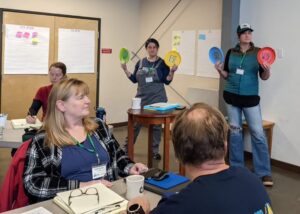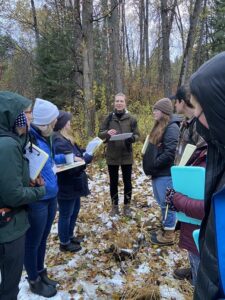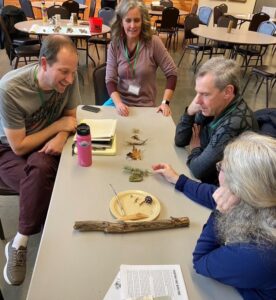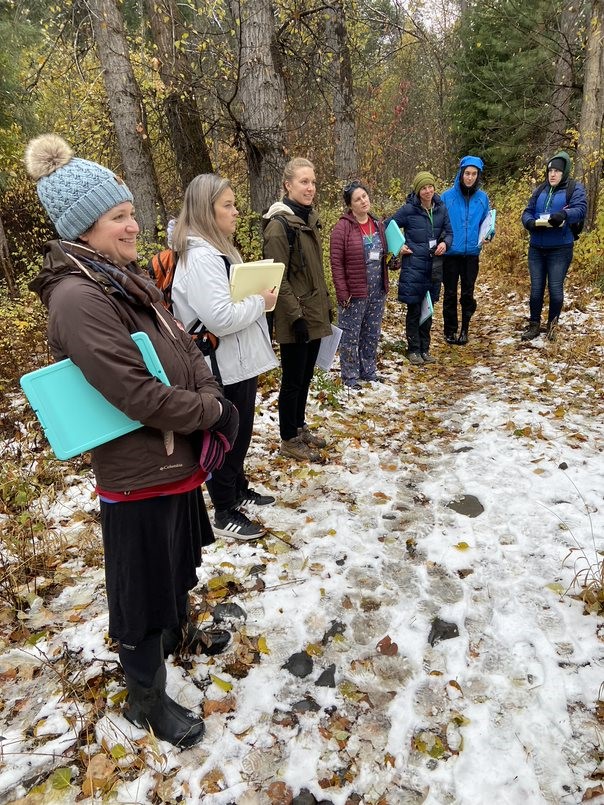The word ‘fun’ doesn’t leap to mind when considering educational standards. Hitting Next Generation Science Standards (NGSS) is challenging enough. Add Social and Emotional Learning (SEL) targets, Environmental and Sustainability Education (ESE) standards and Culturally Responsive Teaching principles and educators may be forgiven for wanting to throw in the towel.
That’s what made one presentation at the Outdoor School for All fall training so memorable. PEI Coordinators Megan Rivard, Molly Griffiths and Lara Tukarski led an engaging and energetic outdoor-based High Impact Field Experience (HIFE) activity and alerted participants with hand-held signs every time they were hitting a standard.

“It was great,” says PEI’s Multicultural Program Coordinator Lourdes Flores. “They were very creative about demonstrating which of the standards you reached when you’re doing HIFEs. They would indicate when they were doing SEL, NGSS, ESE or calling Best Practices for Outdoor Learning Schools.”
Held at the Lazy F Ranch and Retreat in Ellensburg, the Outdoor School Washington (OSW) training was designed for public school teachers/staff interested in starting an outdoor education program, staff from outdoor school sites that do not currently offer outdoor education, and staff from outdoor school sites that do offer education but would like to enhance their programming. As Washington State’s leading organization for aligning outdoor-based learning to state and national education standards, PEI played a central role.
An outdoor camp director realized how modifying her program could achieve multiple learning standards at the same time. “She was learning a lot about Social and Emotional Learning (SEL) and how to structure activities so that kids could engage in rigorous learning outside. Then she started to develop relationships with several teachers who were looking for a site to bring their students.”
— Amy Keiper, PEI’s Northwest FieldSTEM Coordinator
In all, 64 K-12 educators and outdoor school staff members, including nine PEI staff, attended the four-day

workshop. Flores and Northwest FieldSTEM Coordinator Amy Keiper were responsible for supporting their colleagues in developing presentations to address various standards. The pair also led a Professional Learning Community (PLC) session the first night to introduce key concepts and answer questions.
The week was jam-packed as educators from across the spectrum of outdoor camps and K-12 schools shared knowledge, asked questions and attended workshops. Nightly campfire activities followed PLC sessions based on interest. Daily workshops covered topics in the areas of Environment and Sustainability Literacy, Culturally Responsive Teaching, Risk Management, Aligning with State Standards, Since Time Immemorial Curriculum, FieldSTEM, ClimeTime, Establishing Structures for Outdoor School Operation, High School Counselors at Outdoor School, and Outdoor Schools in WA: The Big Picture.
One moment stood out for Keiper as exemplifying the training’s purpose in action. She observed an outdoor camp director seeing how modifying her program could achieve multiple learning standards at the same time. “She was learning a lot about Social and Emotional Learning (SEL) and how to structure activities so that kids could engage in rigorous learning outside,” says Keiper. “Then she started to develop relationships with several teachers who were looking for a site to bring their students.”

Flores noticed one camp director from Ocean Shores who wasn’t sure what to expect at the beginning of the week. “He wanted to know how to develop more program designs and how to connect with teachers,” she explains. “He made some great connections with teachers in his area and was very satisfied with the results.”
Outdoor School Washington will be hosting another workshop in the spring, with the focus and participants yet to be decided. “It hasn’t been determined if we want to continue with the people who attended this workshop or invite a whole new set of educators to experience a similar program,” says Keiper. “Either way, we’ll be continuing these relationships. All PEI coordinators now have more sites and schools who want to talk with them and use our resources.”
